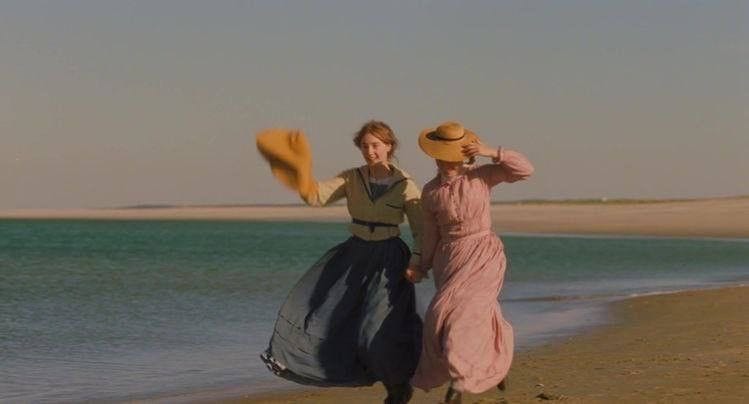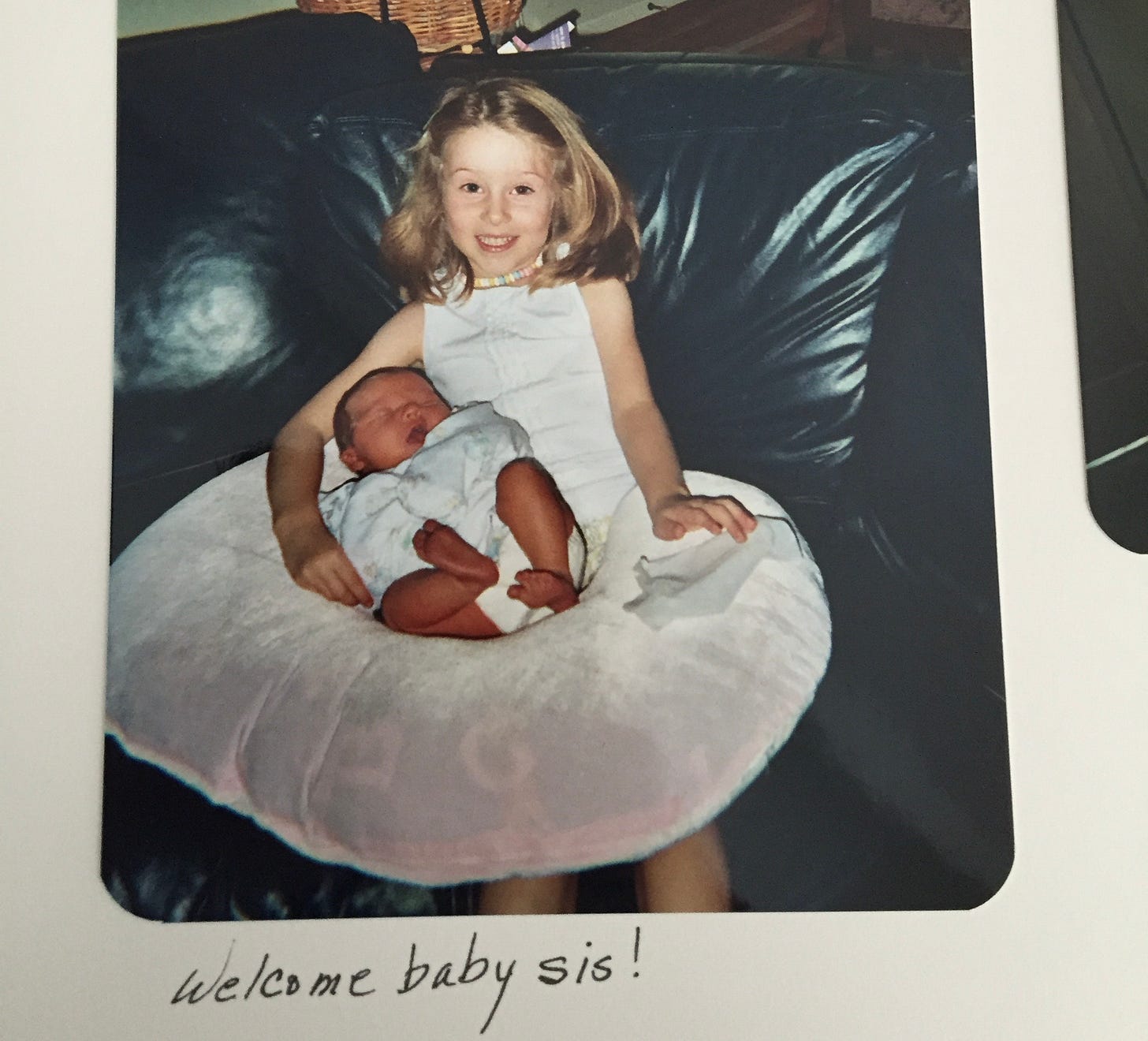One of my earliest memories is coloring a picture with crayons at my grandparents’ house at age five. My little sister was a little over one year old and I had just gotten over the disappointment of her being born as a baby and not a girl my age. When my parents announced the news of my getting a little sister - gaining a “new friend” - they neglected to mention that she would be so small - so listless. I didn’t realize she wouldn’t be able to walk or talk or play - at least not for a long time. I had seen babies before, of course, they just didn’t fit into my little sister schematic - the fantasy of having a built-in best friend to do everything with. In my head, babies were nuisances that existed outside of my household - in strollers at the grocery store, nursing on park benches, screaming at a shopping mall. As a four-year-old, I couldn’t do much with my baby sister, other than exchange wordless blinks, and play a few rounds of peek-a-boo. None of that was particularly exciting to me at the time.
You can imagine my indifference when my parents picked me up from my grandparents’ to tell me that they had just gotten back from the doctor’s office. They told me that I would soon have two little sisters - another one was growing in my mom’s stomach. I registered it quickly and painlessly - there would soon be another swaddled, sensitive roly-poly to trade blinks with, whatever, I guess. In response, I told my parents I had news too: I colored a picture at my grandparents’ house and it turned out really great, did they want to see it?
It wasn’t until I turned seven, a few years later, that I began to register babies as beings with consciousness, and not just highly lifelike dolls for my parents. With my middle sister now four years old, I discovered that babies inevitably grew up - they learned how to walk and talk and play, it just took them a little more time than I wanted. At this age, I realized that I could accompany the process of my sisters growing up - perhaps even try to speed it up - by doing more than just blinking at them. I could teach them, I could lead them. I could be like the celebrity fifth graders I looked up to on the playground - cool, mature, and all-knowing.
From then on, I became like a personal assistant to my parents. I watched how my mom fed my youngest sister applesauce - with a small spoon, giving her thirty seconds or so to digest between each bite - and asked if I could try. When it came time to cross the street, my hand implicitly reached for my sisters, feet planted on the sidewalk until I felt a small palm grip my index finger. I talked to them about school and showed them all the things I could do - kick a soccer ball, run super fast, pirouette around the kitchen - knowing that what they didn’t consciously understand, they could just absorb for now, preparing them for when they could actually kick, run, and dance later on in life.
There are home videos at my childhood house that I watch from time to time - VHS tapes recently converted to DVDs. They document my big sister role better than I ever could remember. I’m small in the videos but my sisters are positively tiny - mops of dark blonde hair and chubby legs, bounding around backyards, playgrounds, and living rooms. Even when I’m talking to the camera, I’m clearly preoccupied with my sisters, keeping an eye on them in my peripheral vision, reaching my hand out automatically to keep them from running into a table corner or the middle of the street. I’m like a little mother - practicing parental anxieties, playing worried.
My grandpa has a handful of home videos converted to digital files on the computer in his home office. One of them features my youngest sister at age two or three running around a hotel pool. She’s wearing a bulging swim diaper and a yellow life jacket that swallows her minuscule frame. She approaches a small, tamely sloped waterslide that drops off into the shallow end of the pool. She sits and is about to push herself down the slide, but then cutely shakes her head at my grandpa, gets up, and begins waddling away - she’s too scared. “Wait!” my grandpa gently calls to her from behind the camera. “Maddie’s at the bottom of the slide, she’ll catch you!” Upon hearing this, my sister’s face lights up - she turns around and runs back to the water slide with small steps. She plops down and begins scooting herself down the slide with her feet and, sure enough, there I am at the bottom, smiling widely and ready to catch her. As soon as my sister reaches the end, I catch her in my hands and bounce her in the water. She claps and splashes, both of us laughing with delight - hearts equally warmed.
I have many memories of my sisters needing my help - of them asking me to lift them to grab something off a high shelf, of them coming into my room after a nightmare, hands shaking. I felt like a star to them - they were respective moons orbiting my Earth. As they grew up - into awkward elementary and middle schoolers - I watched them develop something approximating personalities - preferences, habits, compulsions, and so on. However, as a teenager, I selfishly regarded these qualities as simply offshoots of my own personality, as I observed them liking the same music I liked and behaving the way I did when I was their age. In my developing, self-centered mind, I considered myself the original edition, and them as mere copies - altered slightly due to natural variation. If this thought was more malicious, it might border on narcissism - in high school, it more so just manifested as a kind of helpful confidence.
They would explain what they were up to as sixth and eighth graders with energetic fervor. “Oh yeah, I remember doing that when I was in middle school,” I would respond, carrying an air of authority - an air of been-there-done-that. It wasn’t that I was trying to diminish their excitement per se, just emphasize that my coolness was unshakable. Highlight that I’m always one step ahead - anything they’re learning to do, I’ve already mastered.
“They’re like little versions of you!” my friends would say. “Like little carbon copies!” And I would nod with pride. My sisters were growing into funny, sociable, thoughtful young people - and it was all because they were iterations of me! I relished every compliment they received, knowing that it ultimately spoke to what a great influence I was. My self-esteem was derived from a handful of unstable external sources - male validation, academic achievement, and my sisters becoming good, likable people. My sisters always looking up to me, literally and figuratively. Always coming to me for advice, confiding in me, trusting me to be the keeper of their secrets and fears. The first recipient of their good and bad news. Being a big sister - and all of its implications - was my identity - the source of my confidence.
Today, my sisters and I are approaching a life stage I’ve always been curious about - a stage where we are all adults - and young adults at that. This year, for the first time, all three of us will be old enough to vote in the upcoming presidential election. All three of us can buy lottery tickets or be summoned for jury duty. In a couple more years, we’ll all be out of school. We’ll all be able to buy a drink or a pack of cigarettes together, if we want.
Other things are changing too, beyond what we’re allowed to do in the eyes of the law. We’ve entered a stage in which my sisters don’t need me anymore, at least not like they used to. They don’t need me to lift them to grab something off a high shelf or catch them at the bottom of a waterslide - one of them is taller than me. They don’t always want to ask me questions or tell me everything - I’m not their only teacher, I’m not their primary confidante. For the first time in my life, my sisters are experiencing things that I, their big sister, have never experienced. They are developing senses of style and personalities that are unique - that are, in many ways, completely different than me. I am definitely not the coolest person in their life anymore.
Today, my sisters feel less like extensions of me, and more like individuals in their own right. I sometimes find myself grieving the way they once viewed me, and quickly feel pretty stupid. My sisters were obviously always individuals in their own right - they were the second they were born. When I moved to the other side of the country two years ago, I was terrified - what would they do without me? They needed me! But here they are today, not just surviving, but living full and meaningful lives. Continuing to become funny, sociable, and thoughtful people. It just doesn’t reflect solely on me anymore, it might actually reflect more on them. My confidence is selfishly fractured.
All these years, I thought my little sisters relied on me - and they certainly did. I just discounted how much I relied on being their big sister. How much I needed someone to catch at the bottom of the water slide, as much as they needed to be caught.
The truth is, as they continue growing into themselves - as I continue growing into myself - I still see shreds of my personality endure. What was once an intact mirror is now shards of a reflective surface - refracting glimpses of my likeness. And as they continue developing their own identities, I see some of them in me. I adopt a little mannerism, a small vocal intonation, and a newfound thought here and there. And I suppose, if I’m lucky, it’ll go on this way forever - just as I had exchanged blinks with them as newborns, we will exchange aspects of ourselves. Recycling habits and tendencies, volleying them back and forth. Shaping one another silently and boisterously.





Love this article , and I know they still think you are pretty cool !
As a little sister who just turned 18, my older sister is one of my best friends. I have no idea how I could have grown up with out her.
I too adore when people say we look alike and act alike even though I think we're completely different. Great read!